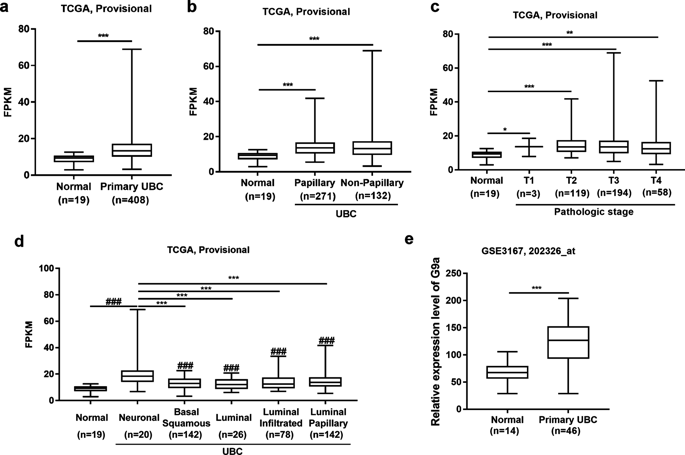当前位置:
X-MOL 学术
›
Acta Pharmacol. Sin.
›
论文详情
Our official English website, www.x-mol.net, welcomes your
feedback! (Note: you will need to create a separate account there.)
Inhibition of G9a by a small molecule inhibitor, UNC0642, induces apoptosis of human bladder cancer cells.
Acta Pharmacologica Sinica ( IF 6.9 ) Pub Date : 2019-02-14 , DOI: 10.1038/s41401-018-0205-5 Yue-Peng Cao 1 , Jing-Ya Sun 2, 3 , Mei-Qian Li 4 , Yu Dong 2, 5 , Yuan-Heng Zhang 2, 3 , Jun Yan 4 , Rui-Min Huang 2, 3 , Xiang Yan 1
Acta Pharmacologica Sinica ( IF 6.9 ) Pub Date : 2019-02-14 , DOI: 10.1038/s41401-018-0205-5 Yue-Peng Cao 1 , Jing-Ya Sun 2, 3 , Mei-Qian Li 4 , Yu Dong 2, 5 , Yuan-Heng Zhang 2, 3 , Jun Yan 4 , Rui-Min Huang 2, 3 , Xiang Yan 1
Affiliation

|
Urinary bladder cancer (UBC) is characterized by frequent recurrence and metastasis despite the standard chemotherapy with gemcitabine and cisplatin combination. Histone modifiers are often dysregulated in cancer development, thus they can serve as an excellent drug targets for cancer therapy. Here, we investigated whether G9a, one of the histone H3 methyltransferases, was associated with UBC development. We first analyzed clinical data from public databases and found that G9a was significantly overexpressed in UBC patients. The TCGA Provisional dataset showed that the average expression level of G9a in primary UBC samples (n = 408) was 1.6-fold as much as that in normal bladder samples (n = 19; P < 0.001). Then we used small interfering RNA to knockdown G9a in human UBC T24 and J82 cell lines in vitro, and observed that the cell viability was significantly decreased and cell apoptosis induced. Next, we choosed UNC0642, a small molecule inhibitor targeting G9a, with low cytotoxicity, and excellent in vivo pharmacokinetic properties, to test its anticancer effects against UBC cells in vitro and in vivo. Treatment with UNC0642 dose-dependently decreased the viability of T24, J82, and 5637 cells with the IC50 values of 9.85 ± 0.41, 13.15 ± 1.72, and 9.57 ± 0.37 μM, respectively. Furthermore, treatment with UNC0642 (1-20 μM) dose-dependently decreased the levels of histone H3K9me2, the downstream target of G9a, and increased apoptosis in T24 and J82 cells. In nude mice bearing J82 engrafts, administration of UNC0642 (5 mg/kg, every other day, i.p., for 6 times) exerted significant suppressive effect on tumor growth without loss of mouse body weight. Moreover, administration of UNC0642 significantly reduced Ki67 expression and increased the level of cleaved Caspase 3 and BIM protein in J82 xenografts evidenced by immunohistochemistry and western blot analysis, respectively. Taken together, our data demonstrated that G9a may be a promising therapeutic target for UBC, and an epigenetics-based therapy by UNC0642 is suggested.
中文翻译:

小分子抑制剂 UNC0642 对 G9a 的抑制可诱导人膀胱癌细胞凋亡。
尽管使用吉西他滨和顺铂联合进行标准化疗,但膀胱癌 (UBC) 的特点是频繁复发和转移。组蛋白修饰剂在癌症发展中经常失调,因此它们可以作为癌症治疗的极好药物靶点。在这里,我们调查了组蛋白 H3 甲基转移酶之一 G9a 是否与 UBC 发育相关。我们首先分析了来自公共数据库的临床数据,发现 G9a 在 UBC 患者中显着过表达。TCGA 临时数据集显示,原始 UBC 样本(n = 408)中 G9a 的平均表达水平是正常膀胱样本(n = 19;P < 0.001)的 1.6 倍。然后我们使用小干扰 RNA 在体外敲低人 UBC T24 和 J82 细胞系中的 G9a,并观察到细胞活力显着降低并诱导细胞凋亡。接下来,我们选择了靶向 G9a 的小分子抑制剂 UNC0642,具有低细胞毒性和优异的体内药代动力学特性,在体外和体内测试其对 UBC 细胞的抗癌作用。UNC0642 治疗剂量依赖性地降低了 T24、J82 和 5637 细胞的活力,IC50 值分别为 9.85 ± 0.41、13.15 ± 1.72 和 9.57 ± 0.37 μM。此外,UNC0642 (1-20 μM) 处理剂量依赖性地降低了组蛋白 H3K9me2(G9a 的下游靶标)的水平,并增加了 T24 和 J82 细胞的凋亡。在携带 J82 移植物的裸鼠中,施用 UNC0642(5 mg/kg,每隔一天,ip,共 6 次)对肿瘤生长产生显着的抑制作用,而不会减轻小鼠体重。此外,UNC0642 的给药显着降低了 Ki67 表达并增加了 J82 异种移植物中切割的 Caspase 3 和 BIM 蛋白的水平,分别由免疫组织化学和蛋白质印迹分析证明。总之,我们的数据表明 G9a 可能是 UBC 的一个有希望的治疗靶点,并且建议 UNC0642 进行基于表观遗传学的治疗。
更新日期:2019-02-15
中文翻译:

小分子抑制剂 UNC0642 对 G9a 的抑制可诱导人膀胱癌细胞凋亡。
尽管使用吉西他滨和顺铂联合进行标准化疗,但膀胱癌 (UBC) 的特点是频繁复发和转移。组蛋白修饰剂在癌症发展中经常失调,因此它们可以作为癌症治疗的极好药物靶点。在这里,我们调查了组蛋白 H3 甲基转移酶之一 G9a 是否与 UBC 发育相关。我们首先分析了来自公共数据库的临床数据,发现 G9a 在 UBC 患者中显着过表达。TCGA 临时数据集显示,原始 UBC 样本(n = 408)中 G9a 的平均表达水平是正常膀胱样本(n = 19;P < 0.001)的 1.6 倍。然后我们使用小干扰 RNA 在体外敲低人 UBC T24 和 J82 细胞系中的 G9a,并观察到细胞活力显着降低并诱导细胞凋亡。接下来,我们选择了靶向 G9a 的小分子抑制剂 UNC0642,具有低细胞毒性和优异的体内药代动力学特性,在体外和体内测试其对 UBC 细胞的抗癌作用。UNC0642 治疗剂量依赖性地降低了 T24、J82 和 5637 细胞的活力,IC50 值分别为 9.85 ± 0.41、13.15 ± 1.72 和 9.57 ± 0.37 μM。此外,UNC0642 (1-20 μM) 处理剂量依赖性地降低了组蛋白 H3K9me2(G9a 的下游靶标)的水平,并增加了 T24 和 J82 细胞的凋亡。在携带 J82 移植物的裸鼠中,施用 UNC0642(5 mg/kg,每隔一天,ip,共 6 次)对肿瘤生长产生显着的抑制作用,而不会减轻小鼠体重。此外,UNC0642 的给药显着降低了 Ki67 表达并增加了 J82 异种移植物中切割的 Caspase 3 和 BIM 蛋白的水平,分别由免疫组织化学和蛋白质印迹分析证明。总之,我们的数据表明 G9a 可能是 UBC 的一个有希望的治疗靶点,并且建议 UNC0642 进行基于表观遗传学的治疗。











































 京公网安备 11010802027423号
京公网安备 11010802027423号